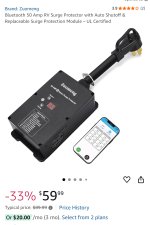John_Mc
Elite Member
- Joined
- Aug 11, 2001
- Messages
- 4,684
- Location
- Monkton, Vermont
- Tractor
- NH TC33D Modified with belly pan, limb risers & FOPS. Honda Pioneer 520 & antique Coot UTV
I used 100 ULL avgas in it, as that stores well and doesn't kill the carb with ethanol. Now the Nazifornia gummint says I can't but that do to the lead in it, a very small amount but enough to dash our governor's fantasy of a perfect world.
We have solar with backup batteries now, so don't need the genny for most outages now. It can plug into our system to provide power/charge batteries if needed so I'm hanging on to it.
I’m a pilot (and former flight instructor). I also used to work for a company that heat treated steel wire by running it through molten lead. For safety reasons, we were forced to learn a lot about lead and its effects on humans. It was mandatory that those working in that heat treating department take a shower before going home. They were also provided company paid uniforms which did not go home with them to avoid them contaminating their homes with lead.
100LL avgas is only “low” in lead as compared to the older 100 octane avgas. The lead content is significantly higher than the older leaded auto fuels. The tetraethyl lead in 100LL is a potent neurotoxin and can cause permanent damage in kids, as their brain is still developing.
I run 100LL in my plane because I have to. I will not run it in anything else. I run non-ethanol auto gas in my generator and all small engines. With a fuel stabilizer, I’ve not had issues with stale gas.



